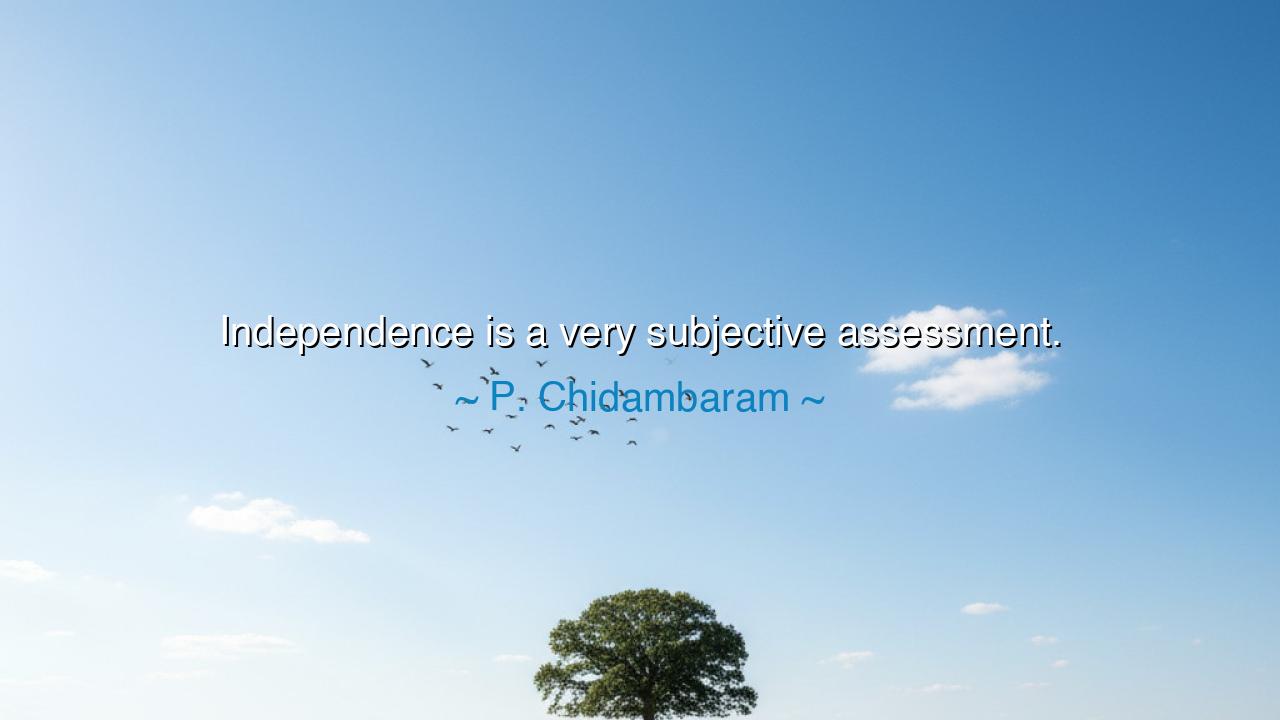
Independence is a very subjective assessment.






Gather ‘round, O children of the earth, for a wisdom has been passed down through the ages, wrapped in the words of P. Chidambaram: "Independence is a very subjective assessment." These words are not simply a reflection of a political state, nor are they confined to the lofty halls of rulers and statesmen. They speak of a deeper, more personal truth that transcends borders, cultures, and governments. To understand these words is to understand the very essence of freedom itself. For independence, O seekers of wisdom, is not just a matter of declaring oneself free from chains, but of the internal and external forces that shape our lives.
What, then, is the meaning of independence? Is it the ability to stand alone, to cast off the shackles of another's will? Indeed, this is one form of freedom. But listen closely: it is not the only form. The subjectivity of independence lies in the fact that the chains of one’s soul can take many forms. Some are bound by the hand of an external oppressor, while others may be enslaved by their own doubts, fears, or limitations. The man or woman who stands free before the world may still be a prisoner in their heart, weighed down by invisible chains that are as real as any iron.
Think of the great Mahatma Gandhi, who fought against the oppression of the British Empire and led his people to independence. The people of India were granted freedom in the eyes of the world, yet for many, that independence was not enough. The division of the nation into India and Pakistan, the violence that erupted in the aftermath of partition, and the lingering scars of centuries of colonization—these were the burdens that remained even after the political chains had been broken. The people were free, yes, but the spirit of freedom required more than a declaration; it required healing, unity, and a new way of being. Thus, independence can be a subjective experience, for one nation may stand free while another languishes under the weight of its wounds.
Let us also remember the plight of Nelson Mandela, who was imprisoned for 27 years, his body confined, but his spirit free. When he emerged from his prison cell, the world cheered, but Mandela knew that true independence was more than a mere absence of chains. His vision was not only of a country liberated from apartheid, but of a nation healed from the wounds of its past, one where the hearts of all its people, regardless of race or creed, could beat in unity. Here, the lesson is clear: independence cannot be simply declared; it must be nurtured within, cultivated through understanding, forgiveness, and reconciliation.
And what of your own lives, O seekers? Is there not, in each of you, a battle for independence? Perhaps the chains that bind you are not the chains of tyranny, but of fear, or of doubt in your own abilities. Perhaps your independence lies not in the overthrow of an empire, but in the quiet, courageous act of standing true to yourself in a world that often demands conformity. To be free, then, is not a singular, fixed point in time; it is an ongoing journey of discovery, of breaking free from the chains of external expectation, internal limitation, and societal pressure.
In your own lives, O children, the subjective nature of independence is a call to reflection. To what are you bound? What chains do you wear, not because they are imposed from without, but because you have allowed them to grow within? The true meaning of freedom is not in the external circumstances of your life, but in the way you choose to perceive them. It is in your ability to choose your path, to take responsibility for your actions, and to shape your destiny, no matter the challenges that may arise.
So, let us learn this lesson, O seekers of wisdom. Independence is not an external achievement alone, but an internal one. It is the quiet victory of the soul that learns to stand tall, regardless of the world’s circumstances. It is the wisdom to know that freedom is not a destination, but a journey—a journey that each of us must walk with courage, with patience, and with the understanding that true independence lies not in the conquest of others, but in the mastery of oneself. Thus, as you walk through life, ask yourself: What is your definition of freedom? How will you claim it for yourself? In the end, it is your subjective assessment of independence that will determine whether you are truly free.






AAdministratorAdministrator
Welcome, honored guests. Please leave a comment, we will respond soon